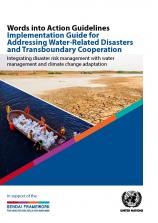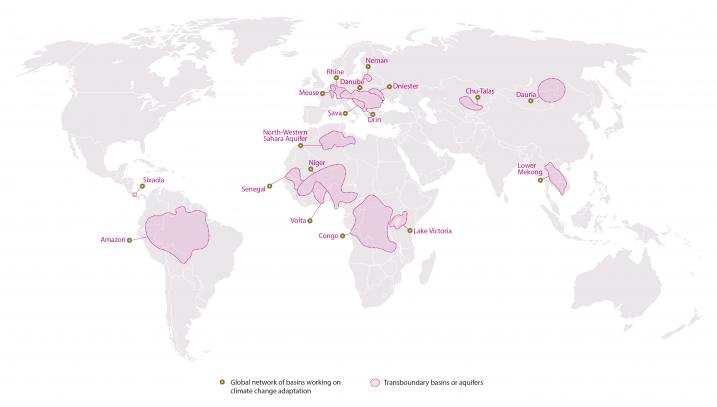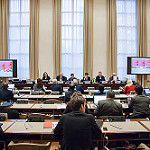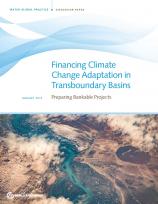 The Guidance on Water and Adaptation to Climate Change, adopted by the Meeting of the Parties and published in 2009, is still relevant and provides step-by-step advice on how to adapt to climate change, with a special focus on transboundary basins.
The Guidance on Water and Adaptation to Climate Change, adopted by the Meeting of the Parties and published in 2009, is still relevant and provides step-by-step advice on how to adapt to climate change, with a special focus on transboundary basins. A collection of lessons learned and good practices on climate change adaptation in transboundary basins was developed in 2013-2015 as a complement to the Guidance on Water and Adaptation to Climate Change in cooperation with the International Network of Basins Organizations (INBO) as well as other partners. The publication intends to compile, analyse and disseminate experiences, and thereby to demonstrate and illustrate important steps and lessons learned as well as good practices to take into account when developing a climate change adaptation strategy for water management in the basin or transboundary context.
A collection of lessons learned and good practices on climate change adaptation in transboundary basins was developed in 2013-2015 as a complement to the Guidance on Water and Adaptation to Climate Change in cooperation with the International Network of Basins Organizations (INBO) as well as other partners. The publication intends to compile, analyse and disseminate experiences, and thereby to demonstrate and illustrate important steps and lessons learned as well as good practices to take into account when developing a climate change adaptation strategy for water management in the basin or transboundary context.
The Implementation Guide for Addressing Water-Related Disasters and Transboundary Cooperation was developed in 2016-2018 by a multidisciplinary drafting group in collaboration with UNDRR to support implementation of the Sendai Framework for Disaster Risk Reduction 2015-2030 and provides practical and evidence-based advice on integrating disaster risk management with water management and climate change adaptation. The Sendai Framework, adopted at the Third United Nations World Conference on Disaster Risk Reduction in March 2015, stresses the importance of transboundary cooperation. A number of targeted Sendai Framework implementation guides are being developed at the moment, including the Words into Action guide on water and climate change.
Pilot projects on the Chu-Talas, Dniester, Neman and Sava (outline of the Sava climate adaptation strategy) are directly implemented by the Water Convention in cooperation with other organizations such as UNDP, OSCE, UNEP, and WMO.

- The Amazon river basin, shared by Bolivia, Brazil, Colombia, Ecuador, Guyana, Peru, Suriname and Venezuela[1]
- The Congo, river basin, shared by Angola, Cameroon, Central African Republic, Gabon, the Democratic Republic of the Congo and the Republic of the Congo
- The Danube river basin, shared by Austria, Bosnia and Herzegovina, Bulgaria, Croatia, Czech Republic, Germany, Hungary, the Republic of Moldova, Montenegro, Romania, Serbia, Slovenia, Slovak Republic and Ukraine
- The Drin river basin, shared by Albania, the Republic of North Macedonia, Kosovo[2], Montenegro and Greece
- Lake Victoria, basin, shared by Burundi, Kenya, Rwanda, Tanzania and Uganda
- The Lower Mekong river basin, shared by Cambodia, Laos, Thailand and Vietnam
- The Meuse river basin, shared by Belgium, France, Germany, Luxembourg and the Netherlands
- The Niger river basin, shared by Benin, Burkina Faso, Cameroon, Chad, Côte d'Ivoire, Guinea, Mali, Niger and Nigeria
- The North Western Sahara Aquifer System (NWSAS), shared by Algeria, Libya, and Tunisia
- The Rhine river basin, shared by France, Germany, Luxemburg, the Netherlands and Switzerland
- The Rivers and Wetlands of Dauria Steppes (Upper Amur, Ulz-Torey and Selenge-Baikal basins), shared by China, Mongolia, and the Russian Federation
- The Senegal river basin, shared by Guinea, Mali, Mauritania, and Senegal
- The Sixaola river basin, shared by Costa Rica and Panama
- The Volta river basin, shared by Benin, Burkina Faso, Côte d'Ivoire, Ghana, and Togo
[1]The listed countries include only the members of the river basin organisations in all basins where they are established.
[2]United Nations administered territory under Security Council Resolution 1244 (1999).
The latest progress report on activities of the pilot projects and other basins in the Global network is available here.
 The platform for sharing experience includes regular workshops and a web-based platform. The range of annual workshops on water and adaptation to climate change brings together water and climate experts from around the world to share experience and lessons learnt. During these workshops, different examples and approaches for adaptation to climate change are being discussed such as dealing with uncertainty, using and preserving ecosystems for adaptation, structural measures, reducing water use, integrated flood management, economic analysis for evaluating adaptation options, linkages between health, water and adaptation, etc.
The platform for sharing experience includes regular workshops and a web-based platform. The range of annual workshops on water and adaptation to climate change brings together water and climate experts from around the world to share experience and lessons learnt. During these workshops, different examples and approaches for adaptation to climate change are being discussed such as dealing with uncertainty, using and preserving ecosystems for adaptation, structural measures, reducing water use, integrated flood management, economic analysis for evaluating adaptation options, linkages between health, water and adaptation, etc.2020: Thematic session on mainstreaming transboundary aspects of water management into climate-related documents at the eleventh meeting of the Task Force on Water and Climate Change
2019: Global workshop on Ecosystem-based Adaptation in Transboundary Basins and Fourth meeting of the Global network of basins working on climate change adaptation
2017: International Workshop on Water Scarcity and Ninth meeting of the Task Force on Water and Climate
2016: Third Meeting of the Global network of basins working on climate change (6-7 April 2016)
2014: Fifth Workshop on adaptation to climate change in transboundary basins. Adaptation strategies: which measures for which outcomes at transboundary level
2013: Fourth Workshop on water and adaptation to climate change in transboundary basins: best practices, success factors and lessons learned
2012: Third workshop on water and adaptation to climate change: Making adaptation work
2011: Second workshop on water and adaptation to climate change: challenges, progress and lesson learnt
2010: First workshop in adaptation to climate change in transboundary basins
2009: Workshop on transboundary flood risk management
2008: International Workshop on Adaptation to Climate Change in Water Sector
Financing climate change adaptation in transboundary basins
Basin organisations and national authorities need to move toward implementing concrete measures contained in adaptation strategies (both structural and non-structural measures), such as flood protection infrastructure, storage reservoirs, green infrastructure or soft measures. Numerous funding mechanisms are now available from climate funds, multilateral development banks and development cooperation partners. However, basin organisations and national authorities often lack the capacity, knowledge and resources to prepare bankable project proposals for transboundary cooperation on climate change adaptation.
The Water Convention secretariat in cooperation with the African Water Facility (AWF/AfDB), the European Investment Bank (EIB), the International Network of Basin Organizations (INBO), the World Bank, the governments of the Netherlands and Switzerland organized training on how to prepare bankable projects for financing climate change adaptation in transboundary basins. The training was held on 21-23 June 2017 in Dakar, Senegal, hosted by the Senegal River Basin Development Authority (OMVS). Later two similar regional trainings were organised for the Lake Chad and Drin basins in cooperation with the Lake Chad Basin Commission and the Global Water Partnership Mediterranean (N'Djamena, 19 to 21 November 2018 and Tirana, 25 and 26 November 2018, respectively).

As a result of the training in Dakar, a publication Financing climate change adaptation in transboundary basins: Preparing bankable projects was developed in 2019 by the World Bank in cooperation with the UNECE, INBO, the African Water Facility/African Development Bank, the Netherlands and Switzerland. This guide helps countries and river basin organisations to identify potential mechanisms and conditions of relevant donors providing funds for climate change adaptation and transboundary cooperation.
International cooperation
The climate change activities under the Water Convention are led by the Netherlands and Switzerland and made possible by funding from Austria, Finland, the Netherlands, Switzerland, the European Commission and European Investment Bank.
UNECE also cooperates with AGWA and the European Commission as well as UNFCCC and UNDRR to find coherence and interlinkages between global processes on water, climate change and disaster risks reduction. UNECE forms part of the Transboundary Water Cooperation Coalition which issued a policy brief with strong arguments on why transboundary water cooperation is key to tackle climate change and to inform the discussion at the 28th Conference of the Parties to the United Nations Framework Convention on Climate Change. The policy brief is available here.
A leaflet about the Climate Change activities under the Water Convention can be found here: English, French, Russian, Spanish.
1 United Nations administered territory under Security Council Resolution 1244 (1999).

